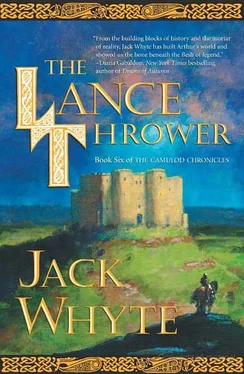He paused, and then nodded his head once, quickly, and when he resumed he looked me in the eye again, no trace of a smile on his features. “But my given name is Arthur, and I am the Chief of Pendragon, and so be it you were serious about joining with us, I think we two could become friends. What say you, Clothar the Frank?”
My jaw had fallen open as he began to speak, and I knew I was gaping like a simpleton, but now I dropped to one knee in front of him, meaning to kiss his hand as I would a Bishop’s, but he caught me by the arm and pulled me back to my feet. “No, no, none of that. I have done nothing yet to earn that kind of treatment, and you have newly knocked me on my arse. Folly, then, to follow that by kissing my hand.” He smiled again. “When the time comes to swear loyalty to me, I will let you know. For the time being, if you feel a need to be ceremonious, you can call me Magister, as the others do. Now, what about those spears you have? Will you show me how and why they are different from ours?”
Before I could respond, I had to breathe deeply and calm my racing, exultant heart. I could hear a blackbird piping somewhere among the woods to my right and another, equally melodious and exultant, singing its heart out behind us, and hearing them both united in a paean of triumphant, all-consuming beauty, I felt all at once that anything would be possible in this new land to which I had brought my friends with the thought of serving this impressive man. And when I felt able to speak again without quavering, I nodded my head, partly in acknowledgment, partly in respectful awe.
“Aye, Magister,” I said, addressing my King thus for the very first time, “I will.”
AUTHOR’S NOTE
The thesis
In approaching this story, I was forced to come to terms with a few historical realities that bore heavily upon my vision of how the legend of King Arthur came into existence. In my mind, the entire story revolves around the Arthur/Guinivere /Lancelot triangle, and everything that occurs in the legendary tale is attributable to the humanity—and the human weaknesses—of the King himself, the dysfunctional nature of his marriage to Guinivere, and their joint attraction to the brilliant foreign warrior known as Lancelot.
But here’s the rub: Lancelot of the Lake, Lancelot du lac, is a French name, and Lancelot himself, the legend tells us, was a French knight who crossed the sea to England expressly to serve as a Knight of the Round Table at King Arthur’s Court. Well, even making allowances for legendary exaggeration, that simply could not have happened in the middle of the fifth century, because in those days England was still called Britannia and what we call France today was still Roman Gaul.
It would not be until at least a century later, when the Anglo-Saxon invasions of Britain finally came to an end with the tribes called the Angles emerging as the dominant force, that the country would begin to become known as the land of the Angles—Angle land, and eventually, England.
By the same token, Roman Gaul would not become known as France until much later, when the invading Franks finally established their dominance over their arch rivals, the Burgundians. Over time, the Frankish territories became the land of the Franks—France—while the Burgundians remained in their own territories of Burgundy.
Reputedly wonderful horsemen, the Franks are the people generally credited with bringing the stirrupped saddle to western Europe, and from the time of their first appearance in the Roman Empire, along the Rhine River in the third century, they had a reputation for being blunt-spoken and utterly tactless, probably because their original tongue contained few of the subtleties of Latin or Greek. Be that as it may, we still use the term “speaking frankly” to denote directness and an unwillingness to mince one’s words. There were two main tribal branches of Franks: the Salian Franks, who lived in what is now northern France, Belgium, and the Netherlands, and the Ripuarians, who lived in the southwest of France and in what is now Switzerland.
Clothar is my interpretation of Lancelot. Academic opinion indicates that the name Lancelot probably developed from the Latin word lancearius, a Roman military denomination that was probably similar to the European lancer regiments of the nineteenth century. In Clothar, I have posited a Frankish horse-warrior who comes to Britain, befriends the High King, Arthur, and earns himself an undying reputation as an archetypal hero, the character who will be called Lancelot centuries later by French storytellers who have heard of his fame and his exploits, but have lost awareness of his real name.
The names
It was an anomaly of Roman society that the names given to children appear to us to be relatively unimportant, but it is true that many children were named simply according to the order of their birth. The first three or four sons of a family might be called Gaius or Caius, Marcus or Paulus, but the fifth son was likely to be Quintus, which means fifth, and thereafter, in large families, would come Sextus and Septimus or Septimius (sixth and seventh). Octavius Caesar, who would name himself Caesar Augustus, was the eighth son of his parents.
Roman place names give us problems today, too, because they are Latin names and the modern cities that have replaced the Roman originals all have different names. For the sake of authenticity in a story like this, however, it would be really jarring and unnatural to use the modern place names, and so I have supplied a list (below) of the most important place names in this story, along with their modern equivalents. The most obvious and enlightening example of this usage is the Roman fort at Lutetia in Gaul. It was originally built during the Gallic Wars of Julius Caesar, and its sole purpose, situated as it was on a critical river ford, was to keep a lid on the warlike activities of the local tribesmen, a clan called the Parisii. That fort, Lutetia, has since grown to become the city of Paris.
ROMAN NAME MODERN NAMEGenava GenevaAutessiodurum AuxerreTreves TroyesMassilia MarseilleCarcasso CarcassonneLutetia ParisLugdunum LyonsCenabum Orleans
Language
The major difficulty an author faces in writing historical fiction is that of language. Language is constantly evolving and we have no real knowledge of how people spoke and sounded, in any language, hundreds of years ago. I have chosen to write in standard English, but even that is a relatively new development, since the language was only “standardized” in the nineteenth century. Prior to that time, there was no orthographically correct way to spell anything. Most of the characters in my stories would have spoken in the ancient Celtic, Germanic, and Gallic tongues, while the major characters, like Bishop Germanus and his associates, would most probably have conversed in Latin. In those instances where people of mixed tongues met and mingled, they would have spoken the lingua franca of their time, although the real lingua franca, literally, the Language of the Franks, had not yet come into common use. But throughout history, whenever people of mixed tongues and races have come together to trade, human ingenuity has quickly developed basic, fundamental languages to fit the needs of the traders. In Africa, in the eighteenth and nineteenth centuries, that language was Swahili. In Oriental Asia, it was Pidgin. We do not know the name of whatever trading language was dominant in fifth-century Europe but I have chosen to call it the Coastal Tongue, because the coast was the interface point for most traders.
There are many terms and expressions used in this story, however, for which there is no modern equivalent, and there are others that seem modern and up-to-date when in fact they are genuinely ancient. I have addressed a few of these in the notes that follow here. Modern readers are sometimes surprised, for example, to find the term and title “Duke” being used in the ancient world, but the word originally sprang from the Roman army, where a man who had distinguished himself by demonstrating spectacular heroism and leadership could earn himself the title of dux, which is the Latin word for a leader, a man who is foremost among his companions, and out of that title came the English title of Duke.
Читать дальше









